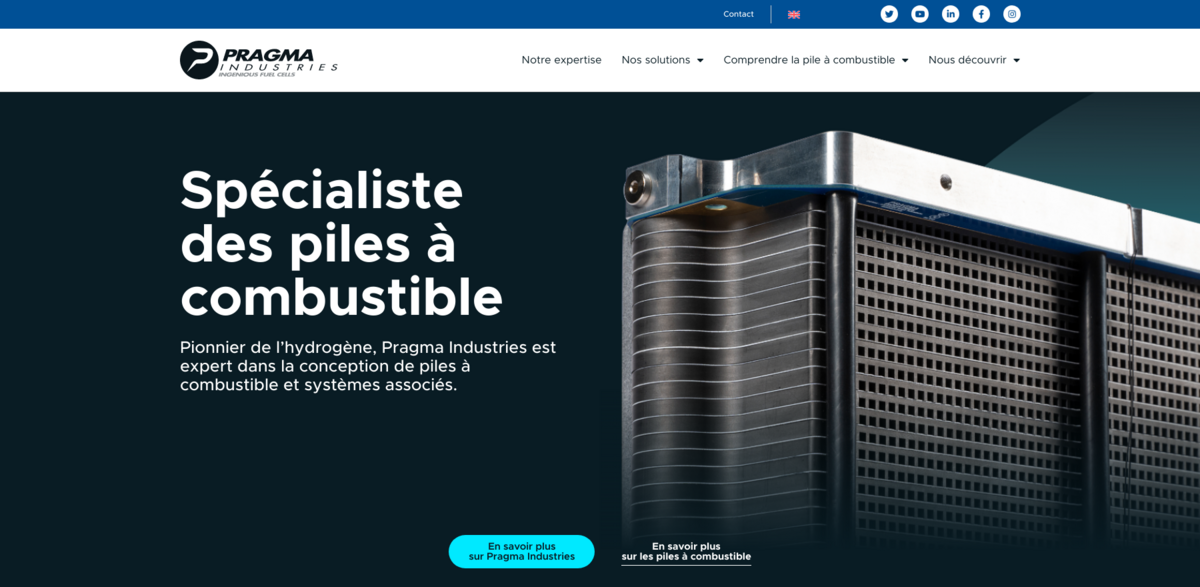What is Pragma Industries?
Founded in 2004, Pragma Industries is a pioneer in hydrogen technology and a specialist in fuel cells. This company designs innovative fuel cells and associated systems, focusing on light mobility and hydrogen energy. Their expertise lies in Proton Exchange Membrane (PEM) technology, which allows for compact fuel cells with impressive power density. These open cathode systems are not only easy to install but also simple to operate, making them a practical choice for various applications. Pragma Industries is more than just a manufacturer; it’s a true laboratory of innovation dedicated to advancing the energy transition with virtuous technologies.
Main Benefits and Key Figures
Pragma Industries offers a range of fuel cells that stand out for their efficiency and design. Here are some key facts and figures that highlight their strengths:
- Power range from 100W to 1kW, covering diverse energy needs
- Fuel cells manufactured in France, ensuring quality and reliability
- Models include OCS34-10 (100W, 6V), OCS34-25 (250W, 15V), OCS64-25 (460W, 14.4V), and OCS64-50 (960W, 30V)
- Compact dimensions and lightweight design, for example, OCS34-10 weighs only 0.85 kg
- High power density thanks to solid polymer electrolyte technology
- Safe operation with no risk of overheating, short-circuit, or fire
- Environmentally friendly: no toxic materials, fumes, or waste generated
- High tolerance to temperature variations, making them versatile in different climates
Innovative Applications
Pragma Industries’ fuel cells power a variety of cutting-edge applications. Take the “NEO” system, for example—it’s designed for urban light mobility and equips the latest electric-assist vehicles with a patented system that contains zero lithium. Then there’s “ALPHA,” which combines fuel cells with lithium-ion batteries to create a hybrid power source for the first generations of bicycles. And it doesn’t stop there: the “TREKHY” auxiliary generator is a fascinating innovation that produces electricity using just a glass of water and a sachet of powder. These examples show how Pragma’s technology is not only advanced but also practical and accessible.
Technology and Design Features
The core of Pragma’s success lies in its open cathode fuel cell systems. These systems are designed to be simple to integrate and easy to recondition, which means less downtime and more reliability. The solid polymer electrolyte allows for decoupling power and energy, giving users flexibility in how they use the fuel cells. Plus, the compactness of the design means these fuel cells can fit into a variety of devices without adding bulk. It’s this combination of smart engineering and user-friendly design that sets Pragma apart in the hydrogen energy sector.
Company Philosophy and Commitments
Pragma Industries is committed to making technological innovations accessible to all. Their approach is global, aiming to serve the energy transition by developing virtuous technologies that are both sustainable and efficient. The company prides itself on secure storage solutions and environmentally responsible products that generate no waste or harmful emissions. This commitment extends to their partnerships and team, who work tirelessly to push the boundaries of what fuel cells and hydrogen systems can achieve. It’s a forward-thinking mindset that drives every project and product.
Impact on Sustainable Development Goals (SDGs)
- SDG 7: Affordable and Clean Energy – advancing hydrogen fuel cells for clean power
- SDG 9: Industry, Innovation, and Infrastructure – fostering innovation in energy technology
- SDG 11: Sustainable Cities and Communities – enabling urban light mobility solutions
- SDG 12: Responsible Consumption and Production – producing waste-free, safe energy systems
- SDG 13: Climate Action – contributing to the reduction of greenhouse gas emissions
Discovering Pragma’s Digital Presence
For those curious to learn more or stay updated, Pragma Industries maintains an active digital presence. Their official website offers detailed insights into their expertise and solutions, while social media channels like Twitter, YouTube, LinkedIn, Facebook, and Instagram provide dynamic content and community engagement. Whether it’s exploring their latest innovations or understanding the science behind fuel cells, these platforms make it easy to connect with the company’s mission and vision. It’s a modern approach to sharing knowledge and fostering collaboration in the hydrogen energy space.


















